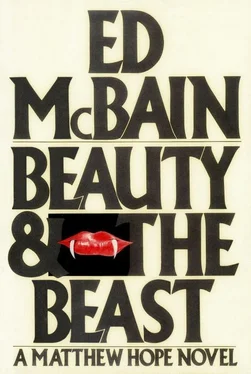“Can he afford the services of the best criminal attorney in Calusa?”
“Benny Weiss is the best criminal attorney in Calusa.”
“That’s an unkind cut, Matthew. If Benny’s such a hotshot, go to Benny.”
“He turned me down.”
“Why, may I ask?”
“He thinks Harper’s guilty.”
“So what? You’ll pardon me, Matthew, but that’s amateur night in Dixie. Who cares whether your man is guilty or not? Either you’re a gladiator or you aren’t. Either you’re willing to go into that arena and risk your reputation — even for a cause you don’t believe in — or else you get fat and lazy and that son of a bitch gets to send more and more people to jail or to the chair. I don’t care if a thousand witnesses saw your man carve up his wife with a butcher knife—”
“She was incinerated.”
“Who cares what she was? Stabbed, shot, strangled, hanged, who cares ? The fun is in convincing a jury that your man couldn’t possibly have done it in a million years. That’s the fun of it, Matthew.”
I could hardly equate the attempt to save Harper’s life with unbridled joy, but I said nothing. I needed Willoughby, and he knew it.
“But to answer your question,” he said, “the reason—”
“I forget what the question was,” I said.
“The question was, in effect, ‘Why do I need you?’ I need you because my normal fee would be well beyond what your pauper client can afford.”
“If you get so much ‘fun’ out of it,” I said, “maybe he ought to charge you.”
“That, too, is unkind, Matthew. You may be willing to turn your shop into a charitable organization—”
“You should talk to my partner sometime.”
“Does he share my view? The point is, the grand jury’s brought in a true bill. Once Harper is served with the indictment, we’ll have two, three weeks to enter a plea. Our plea, of course, will be ‘not guilty,’ and we’ll request a trial by jury. Considering the jammed docket, that may not take place till the beginning of the year sometime. The point , Matthew, is that I could not normally expend the time and energy essential to an aggressive defense unless the fee were commensurate with my efforts. Since the case is nominally yours, I can only assume you’d be willing to do all the preparation necessary for—”
“Well, wait a minute—”
“Under my supervision, of course. I’ll tell you what we need, you’ll go after it Are we agreed on that?”
“Well...”
“We would have to agree on that, Matthew. Otherwise, count me out. I’m not suggesting that you have to do the legwork yourself. You can hire investigators to track down your witnesses, you can have some lackey in your office take depositions — unless, of course, you choose to do all that yourself, in which case you can consider it on-the-job training.”
“Thanks,” I said.
“I’ll base my modest fee on however many hours I put in before trial, and however much time I actually spend in court.”
“How much time do you think that’ll be?”
“In court? On a routine homicide? A week, ten days.”
“What’s your hourly charge, Jim?”
“The same as yours, I’m sure.”
“I don’t think Harper can afford that.”
“Then find another champion,” Willoughby said.
“I’ll make a deal with you,” I said. “If you get him off—”
“No deal,” Willoughby said. “This isn’t a collection case, this is murder.” He looked at his watch. “I’ve got someone coming in at one,” he said. “Are we agreed? Your firm handles the preparation — under my supervision — and I handle the trial itself. I get paid my usual hourly fee for whatever time I put in before the trial, and however long the trial may actually run. Does that sound fair?”
“Do I have a choice?”
“There are other lawyers in town,” Willoughby said drily. “Not as good as Benny Weiss perhaps...”
“Okay, okay,” I said.
“Good,” he said. “Here’s where I’d like you to start.”
“Start? He hasn’t even been served yet.”
“He will be served, so why not get a jump on the state’s attorney? None of this’ll be wasted motion, Matthew, believe me. Any edge we can get will be worth the effort. The prosecution’s case will undoubtedly rest on (a) the fact that Michelle Harper made a formal complaint to the police charging that her husband had knocked her around on the night before the murder, (b) the fact that Harper bought a five-gallon can and had it filled with gasoline two days before the murder, (c) the fact that his fingerprints are on the can, and (d) the fact that someone has identified him as the man struggling with his wife on the night the murder was committed. I’m sure that guy at the garage really sold him the can and filled it for him, he has no reason to be lying about that. But how come his fingerprints aren’t on it, together with Harper’s? Talk to him, Matthew, find out in detail how he handled that can, how he filled it, and so on. Talk to Harper, too. Find out whether or not he took that can with him when he went to Miami. If he did, we’ve got trouble because that means it was in his possession and not laying around where anybody could have got hold of it. Fingerprints impress a jury, Matthew, they read too many detective novels and see too many movies. So get after that gasoline can and find out where it came from and where it went and how many people could have got hold of it before it ended up on the beach where the body was found.”
I looked at him and sighed.
“As for this fisherman, whatever the hell his name is...”
“Luther Jackson.”
“White or black?”
“White.”
“No matter. The point is, did he really see Harper on the beach or can we show that his identification can’t be trusted? He’s the first guy you’ve got to talk to, Matthew.”
“Okay,” I said, and sighed again.
“Now about Michelle,” Willoughby said, “who, unfortunately, is unavailable for further comment. She said her husband was the one who beat her black and blue. But how do we know he was?”
“Well, she came to my office...”
“Yes, and you took her to the police. But whose word do we have except Michelle’s — who now happens to be dead? How do we know it wasn’t some other guy who beat her up? And incidentally murdered her the following night?”
“She went to a neighbor for advice,” I said. “It was the neighbor who suggested she come to me.”
“After she heard Michelle’s story, right?”
“Right.”
“From Michelle’s mouth, and nobody else’s. Go see this neighbor — what’s her name again?”
“Sally Owen.”
“Sally Owen, right. Go talk to her, find out exactly what Michelle told her that Monday morning after her husband allegedly beat her up. Maybe Michelle said something we don’t yet know about.”
“All right,” I said.
“But first find this guy Luther Jackson and ask him what he saw and heard on that beach. He’s the prosecution’s star witness, Matthew. Without him, they can flush their case down the toilet.”
“Okay,” I said.
“So much for shooting down the prosecution’s case,” Willoughby said. “That’s only half the battle. Our case relies solely on alibi. Harper claims he was in Miami — with a short excursion to Pompano and Vero Beach — from sometime Sunday morning till sometime Tuesday morning. Okay, if he was really in Miami on Sunday night, then he couldn’t have been here beating up his wife, the way she claimed he did. And if he was really in Miami on Monday night as well, then he couldn’t have been here on the beach with her, where Mr. Luther Jackson says he saw him. If his alibi stands up, we’re home free. Talk to him, Matthew, pick his brain for whatever he can remember about the time he spent on the east coast, locate some guy who saw him pissing off a pier on Sunday night, locate some dame who went to bed with him on Monday night, dig around, get the facts and get the people — especially the people — we’ll need to establish that he couldn’t have been here getting in trouble when he was actually someplace else. Have you got that?”
Читать дальше












